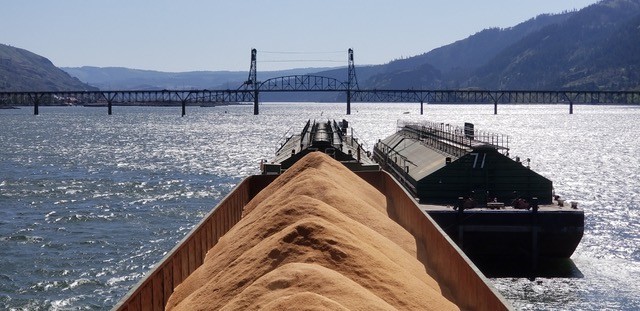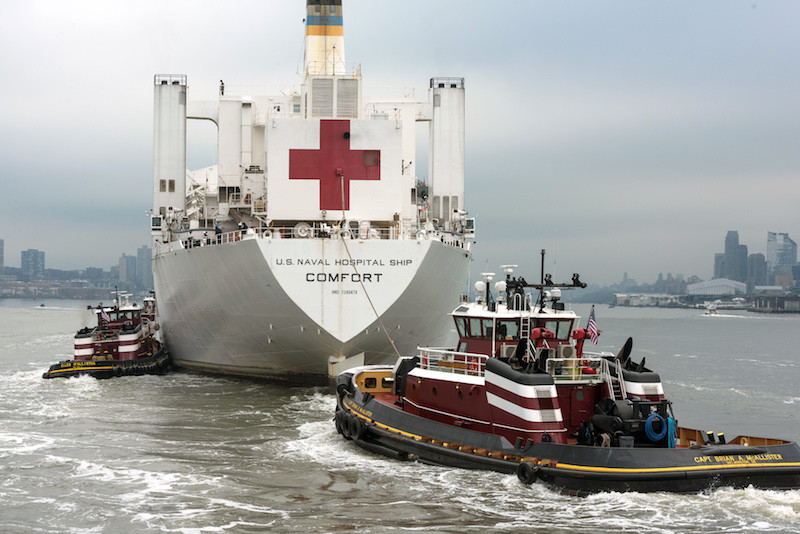As the nation continues to adapt to the evolving global pandemic, the tug, towboat and barge industry is playing a quiet but important role in the national response to the Covid-19 crisis.
For the past 10 months, through lockdowns and major economic shifts, vessels plying the inland and coastal waterways have kept working under strict health protocols, assisting ships arriving at U.S. ports and moving products throughout the inland river system that are keeping the national and global economy going.

Tidewater saw a brief bump in the movement of wood products used in the manufacture of paper products in April due to demands for toilet paper and paper towels. Tidewater Transportation & Terminals photo
For many companies, demand for their vessels has slipped, especially for energy-related products as the pandemic has depressed the worldwide demand for oil. Other barge lines that carry grain mostly for export have thrived. Overall, companies and their employees appear to have adapted well to the new health and sanitary operating rules which have helped avoid widespread Covid outbreaks and kept barge tows moving. Unlike other industries, major layoffs have been avoided.
All maritime companies play a role in the pandemic response in that they are important players in the global supply chain, moving all types of commodities that are crucial to the economy. It might not be obvious, but transporting these products keep refineries, energy plants and factories working, ships full of grain for export, and steel and wood flowing for construction. This keeps many Americans working and assures that products are available for consumers.
COVID-19 BUSINESS
Some companies have seen some business directly related to Covid-19 response, transporting materials used to make medical supplies, hand sanitizer, personal protection equipment, or guiding into port Navy hospital ships called to help in New York and Los Angeles.
Tidewater Transportation & Terminals, Vancouver, Wash., experienced a 5%-7% increase in movements of finished wood products in the Pacific Northwest in April over the same month in 2019, due to a surge in demand for toilet paper and paper towels, according to Geoff Doersler, dispatch and logistic manager. “That has since leveled out, and we’re now back to the status quo.”
American Commercial Barge Line, one of the nation’s largest barge operators, said it has transported more than 1.6 million gals. of denatured ethanol, a key ingredient for alcohol-based hand sanitizers, disinfectants, sprays, wipes and cleaners, along the inland river system since the pandemic began. The Jeffersonville, Ind., company said that several of its towboats took turns pushing barges of denatured ethanol along the Texas Gulf Coast and up the Mississippi and Ohio rivers before it was discharged and processed.
Tug companies along the East and West coasts have also assisted in the arrival and departure of two Navy hospital ships.
Tugs from New York-based McAllister Towing helped dock the USNS Comfort hospital ship when it arrived in New York City on March 30 to support the coronavirus response. Four Z-drive tractor tugs maneuvered the 900-foot Navy vessel into Manhattan’s Cruise Terminal at Pier 90 in the Hudson River.
Before departing New York after treating 180 patients during its month-long stay, the bunkering of the Comfort was handled by Baltimore’s Vane Brothers. “Vane’s bunkering of the Comfort illustrates that our mariners and the job they do were essential to the emergency response that the Comfort provided, as well as to commerce during normal times,” John Bowie, Vane’s New York-based general manager, said at the time.
On the West Coast, tugs from Foss Maritime Co. escorted the USNS Mercy into Los Angeles in late March, where the ship treated non-Covid patients in order to relieve pressure on local hospitals.
At the end of the year, Los Angeles requested that the ship return to help deal with a second Covid-19 outbreak, but the Mercy is currently undergoing extended maintenance at a shipyard in Portland, Ore, and the Navy says it won’t be available anytime soon.
Should a redeployment of the Mercy occur, Foss is ready to assist again, said Jeff Horst, vice president of sales and marketing at the Seattle-based company. He added that Foss also assisted the Mercy into Vigor’s shipyard on the Columbia River for repairs.
This assignment is one example of how maritime companies are helping during the pandemic.
“Our tugs have been assisting ships that we can only assume have been carrying needed supplies to first responders,” Horst said. “Given the volume over the past four months, breaking records for containership arrivals and ships at anchorage waiting to berth, the supply chain is full, and all the maritime community has a hand in being sure we continue operations and keep the supplies moving. Our crew protocols are strict and have proven effective in assuring a healthy workforce.”
Pandemic response has also forced many maritime companies to retool their services and business plans. At Crowley Maritime, Jacksonville, Fla., the company has adapted as their customers have adjusted to new market demands imposed by the pandemic.
“As customers changed, we’ve changed,” said David DeCamp, director of corporate communications. In addition to operating vessels, Crowley is a diversified supply-chain logistics company, serving government and commercial clients with an array of transportation services.
Through its different business units, Crowley has taken on more government and military work, supporting delivery of protective masks, PPE and emergency food deliveries, he said, working with companies in the U.S. and Central America that have retooled their production to make protective equipment.
In April, Crowley shipped a container of donated fresh produce from Puerto Rico to low-income families and community centers in the Hispanic community in New York City that were impacted by the pandemic. The container arrived on Crowley’s LNG-powered containership Taíno in Jacksonville and was then trucked to New York City for distribution.
In the early days of Covid-19, when public knowledge about the virus was just beginning to evolve, Crowley developed a new design and operating concept for a medical support barge. It’s a large deck barge that can be quickly deployed to provide emergency housing for about 500 people during Covid outbreaks. But demand for such a vessel has softened as Covid response has evolved over the past several months, DeCamp said, although the temporary conversion of barges for such medical purposes remains a “viable concept.”
The maritime community, which is considered an essential workforce, has made many operational changes and “done a tremendous job keeping commerce moving and the logistical supply chain viable amidst personal sacrifice,” added Cole Cosgrove, Crowley’s vice president of global ship management.
The next big challenge, he said, will be gaining priority access for the Covid vaccine for maritime workers.
“The challenges have been many — and some still to be resolved — but the maritime workforce remains resilient and continues to serve the worldwide need for goods transportation.”




